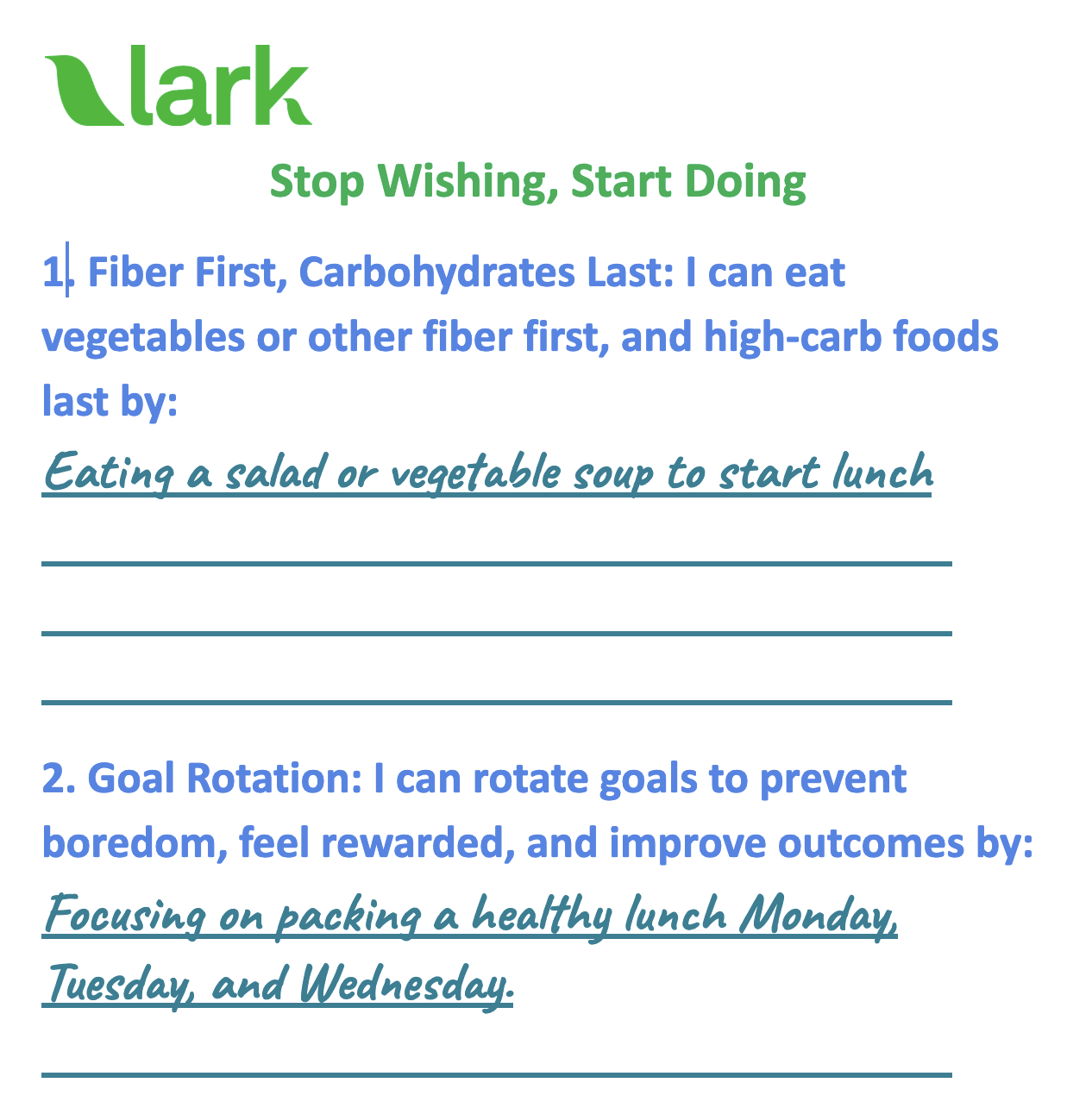In this article:
- Biological hunger is a good reason to eat. People often eat for other reasons, too. There may be emotional eating, cravings, or food that looks good, for example.
- Learning to tell the difference between hunger and other reasons for eating can help you give your body what it needs.
- You can reduce hunger by choosing filling foods, such as high-fiber fruits and vegetables and lean proteins. Getting enough sleep, eating slowly, drinking more water, and keeping less-healthy temptations out of sight can also help you eat according to your body's needs.
- Lark can help you choose more nutritious foods and establish healthier eating habits. These can help with weight loss and health goals.
Hunger is your body's way of telling you to eat. But what happens when hunger cues go awry? That can lead to eating more than your body needs or to choosing foods that don't give the nutrients you need. Having a better understanding of hunger signals can help with weight loss and health goals.
Here's some help on figuring out hunger versus other reasons for eating. Keep reading to see the best foods for reducing hunger and some tips for fighting cravings.
Hunger: Need for Food
Hunger is your body's signal that you need fuel. Your body needs energy from food for exercising and for building or maintaining structures in the body, such as bones and muscles. You need fuel just to stay alive, since it takes energy to keep your heart beating, lungs breathing, and blood circulating.
When you eat exactly as much as your body needs, you'll maintain weight. Eat more than you need, and you'll gain weight. Eat less, and you'll lose weight. An article in Obesity (Silver Spring) explains some factors that may affect hunger.
Babies are born with a sense of hunger and fullness. They know when to start and stop eating. But most adults have learned to eat for other reasons, too.
Other Reasons Why You May Eat
Mayo Clinic challenges you to think about the last time you ate something. Why did you eat it? If you weren't actually hungry, did you eat for one of these reasons, or something similar?
- Boredom
- Stress
- A negative emotion, such as anger, sadness, or loneliness
- Celebration or a positive emotion, such as joy
- Habit
- Temptation of a delicious food within reach
- Craving
All of the above are reasons to eat that aren't related to your body's need for food.
If you last ate because you think you were hungry, were you truly hungry? Or was there another reason your body was talking to you? For example, thirst can sometimes feel like hunger. And being low on sleep makes you feel more hungry, but it doesn't mean you need more calories.
Best Foods to Reduce Hunger
Does it seem like you're always hungry, even if you just ate? Choosing more filling foods can help. They take longer to digest, so hunger stays away for longer. They can help lower levels of hunger hormones. They can also prevent wild blood sugar swings.
The best foods to reduce hunger are high in fiber and/or protein. These nutrients delay hunger for longer after you eat. Good foods to reduce hunger are often also high in water. Water makes foods bigger without adding calories. These are some examples of good foods to reduce hunger.
- Spinach, lettuce, and other leafy greens
- Tomatoes and other non-starchy vegetables
- Egg whites and other lean proteins, such as skinless chicken breast and tofu
- Beans, split peas, and lentils
- Broth-based soup with vegetables, plus protein (such as chicken or beans) if it is a main course soup
- Oatmeal made with rolled, steel cut, or unflavored quick oat
- Reduced-fat plain yogurt and cottage cheese
- Salmon and other fish
- Popcorn and other puffed whole grains, such as puffed brown rice
- Apples and other fruit
Having a small amount of healthy fat can also satisfy hunger for later. Nuts, olive oil, avocados, and seeds are examples. The serving size is small.
Tips to Reduce Hunger
Here are some other ways to reduce hunger.
- Get more sleep. Lack of sleep raises levels of hunger hormones and increases cravings for sugary foods.
- Eat when you are hungry and before you are starving.
- Keep unhealthy foods out of sight and reach. If possible, keep them out of the house or office.
- Choose whole foods, such as fresh fruit and vegetables, instead of processed ones, such as fruit juice. Calories from fluids aren't as satisfying as calories from solid foods.
- Stay hydrated. If you're not sure if you have a hunger or thirst signal, try drinking some water. Then wait several minutes to see if your hunger decreases.
- Eat slowly. It takes about 20 minutes for your brain to realize that you're full.
Mayo Clinic also says to establish a regular eating routine that fits into your lifestyle. Whether it's three square meals daily or several small snacks, being regular can help you interpret hunger more easily.
Losing a few extra pounds can be a great goal. Weight loss can boost health, energy, and confidence. It can be simple. It can happen as part of your regular lifestyle. And you can eat to fight hunger.
Lark makes weight loss simple and fun. With Lark, weight loss and healthy living happen when you make small changes that fit into your lifestyle. Lark offers tips, tracking, instant feedback, and friendly suggestions. Over time, small healthy changes can become habits for long-term success. Your personal Lark coach is available 24/7 through your smartphone so you can get expert tips, track meals, physical activity, and weight loss.
The entire program may be available at no cost to you if your health insurer covers it. Click here to find out if you may be eligible for Lark! You could be minutes away from taking the first steps to hitting your weight loss goals and improving health.



.jpg)








.webp)







